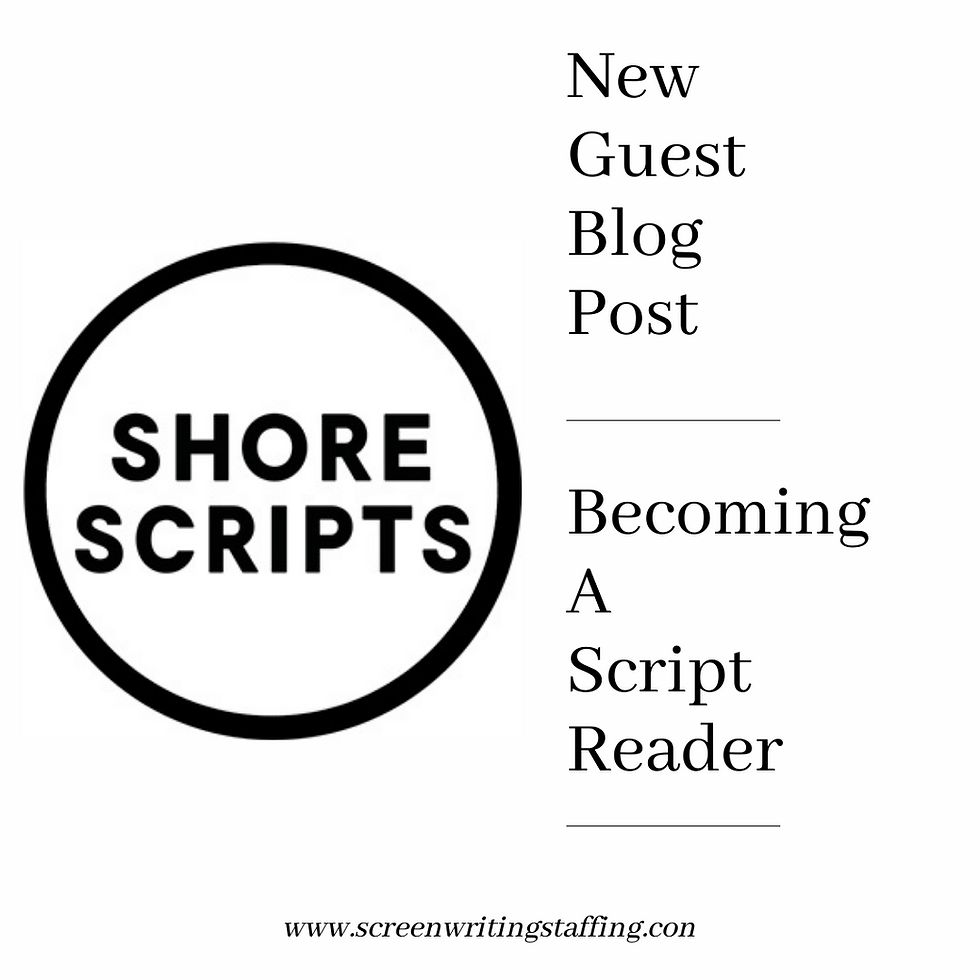How I Got My Start in Script Reading
- Screenwriting Staffing

- Mar 15, 2021
- 4 min read

Guest blog from our friends at Shore Scripts. Quick intro from Screenwriting Staffing's Founder Jacob N. Stuart: Like many other screenwriters first starting, I, too, got my start reading scripts for various companies and contests. At the time. I was based out of Los Angeles, so these jobs were easy to come by. However, with the shift in our industry, getting these jobs no longer requires you to work in Hollywood. Reading scripts is by far the best way to learn the craft, and this is coming from someone who spent many years (and dollars) in film school. Learn about Screenwriting Staffing's new film here. www.screenwritingstaffing.com/gringo
Article by Lee Hamilton:
There are lots of different ways into the industry, but none are perhaps more beneficial in developing your writing craft than being a reader. Reading scripts is, after all, one of the most recommended means of improving your writing, so why not get paid to do it in the process, right?
I secured my job with Shore Scripts nearly nine years ago after subscribing to professional online networking and job-seeking site. Subscribing to groups like these can be a great way to make connections and find entry-level work early on in your career, especially if you live remotely. They’re sometimes paid, and sometimes unpaid, but the more experience you can add to your resume, the better.
Shore Scripts was in the first year of running their contest. They asked me to read an anonymous feature script and write five pages of feedback. The coverage was good enough for them to ask me to write further coverage, and I’ve been writing script analysis ever since.
But, I didn’t just walk off the street and land a job as a reader. I’d completed a degree in Screenwriting at Screen Academy Scotland, and although I can’t quite credit that course in teaching me how to write, it did introduce me to a whole lot of people eager to get into the production, directing, and writing side of the industry.
In fact, it was a friend from that course who forwarded me the details, and part of the benefits of doing the course included a year’s worth of discounts for useful film industry initiatives.
So, whether you study online or attend a college, don’t underestimate the power of networking. Get yourself out there and meet people.
I did what most novice screenwriters do after finishing their first screenplay, I emailed a bunch of production companies looking for work and waited a long time for a reply. In the meantime, I was still writing screenplays and used these online group sites to get peer-to-peer reviews to receive feedback on my work. This was essentially my training ground.
Turns out, not every writer can handle criticism, so this was a great place to learn how to phrase comments in a positive light and to back up statements with examples. It also turned out that not every writer gave good criticism in return, so this was equally helpful in learning what not to do.
After a while, I’d gotten a couple of replies from small London production companies and was given the chance to write one-page reports on solicited and non-solicited scripts they’d been sent. The work was unpaid, but it was also freelance, so it was easy to fit it in while working other jobs. You’ll need to wager whether the experience you gain is worth the lack of pay. In my case, it undoubtedly helped me secure future paid work in the field.
Key points in finding work as a Reader:
Learn your craft! Give feedback and get feedback from as many people as you’re willing. A producer’s coverage is going to be a lot different from coverage from a fellow writer and it’s helpful to understand what different players in the industry are looking for in a script.
Randomly emailing companies for reading jobs can work, but understand you’ll need to provide evidence of your capability. Be prepared to work either in an unpaid capacity or freelance at first but use this as another learning opportunity and a chance to make contacts.
Most importantly, use online sites to find work as well through film and TV production job listings.
And lastly, approach screenwriting contests looking to expand their reader base. Doing this in or around their opening or deadline dates may increase your chances.
You’re going to have to read a LOT if you want to pay the bills. Being a reader doesn’t always pay that well, and you may find you’ll need to work a second job at the same time.
Some readers consider the role as a ‘stepping-stone’ job, and some readers move onto other things, become independent consultants, or work for more than one company.
Use reading as a means to improve your writing. After reading hundreds of scripts, you’ll soon understand how difficult it is to “hook the reader.” Use this to learn what works in a screenplay and what doesn’t and apply it to your writing.
Follow Shore Script on Twitter: https://twitter.com/ShoreScripts

Bio: Lee Hamilton is a script reader, developer, and author. Lee joined Shore Scripts in 2012. Shore Scripts is a screenwriting contest and production platform set up to discovery screenwriting talent from around the world. Lee has since moved into education and development, penning numerous articles, workbooks, and writing courses for Shore Scripts. Lee is also a published fiction author writing under a pen name, and currently developing a non-fiction series.
.png)











Comments